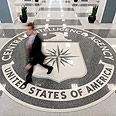
Dagan, ex-CIA chief: Sanctions might stop Iran nuke program
Editorial penned by top diplomats, intelligence officials from Israel, UK, US and Germany calls for 'most robust sanctions in history' to avoid military conflict with Tehran
WASHINGTON – A "potentially decisive economic blow" to the regime in Tehran could stop Iran's nuclear program, according to an editorial penned by diplomats, intelligence officials and military officials from Israel, Germany, Britain and the US.
The article was written by former Mossad chief Meir Dagan, former head of the CIA James Woosley, German intelligence chief August Hanning, former chief of the United Kingdom's defense staff General Charles Guthrie and two American diplomats – Kristen Silverberg and Mark D. Wallace.
Related articles:
- Iran to Hezbollah: Don't strike Israel
- Dagan: Iran strike - only as last resort
- Barak: Iran is feeling the pressure
According to the article, it is possible to avoid a military conflict with Iran, or a nuclear arms race in the Middle East, by passing the "most robust sanctions against Iran in history." Such sanctions, the officials claimed, "would truly isolate" Tehran.
The officials based this rationale on "strong empirical evidence from the last few months that sanctions are having a tangible impact. For example, the value of Iran's currency, the rial, is currently in free fall."

'Tangible impact.' Dagan (Photo: Gil Yohanan)
The editorial was published shortly after a UN report revealed that "sanctions are slowing down Iran's ability to acquire some critical components that are necessary for its prohibited nuclear program. At the same time, it is continuing its forbidden activities, including uranium enrichment."
The experts propose decisive action in four key areas: The Islamic Republic must be fully denied access to the international banking system; companies should be required to disclose any and all investments and business transactions in Iran; the international community must deny Iran's access to international shipping; and insurance and reinsurance companies that operate in Iran should be identified and prohibited from doing business in the US and the EU.
"It's common sense that before undertaking military action against a country, we should first try to dissuade it from its current course by applying decisive economic pressure. Doing so will show the regime that the world is serious and committed, willing to do whatever it takes to stop Iran's pursuit of nuclear weapons," they wrote.
The editorial said the most crippling sanctions to date were denying Iran access to the international banking consortium Swift and the decision by countries to ban or significantly curtail oil imports from Iran.
"History has made clear that the regime will never change course due to half-measures; only serious steps like we've outlined have a chance of success. With Iran finally feeling real impact from international sanctions, now is the time to increase the pressure," the officials wrote.
- Follow Ynetnews on Facebook and Twitter
- Receive Ynetnews updates directly to your desktop










